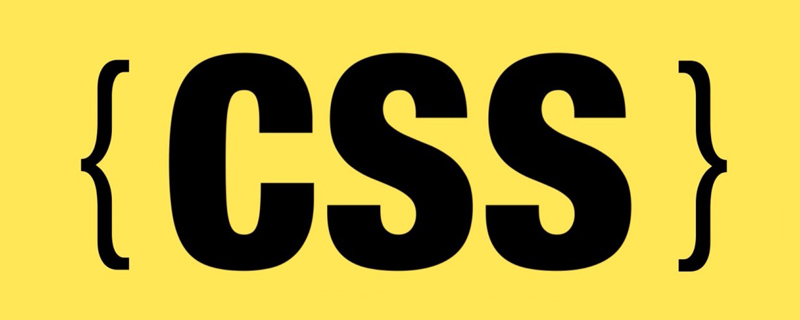The method of specifying the character encoding used by the style sheet in css is very simple. The @charset rule of css is used to specify the character encoding used by the style sheet. Let's take a look at how to use the @charset rule and how to specify the character encoding used by the style sheet.

First of all, let’s understandWhat are character sets and encodings?
A character set is a collection of letters and symbols used in a writing system. For example, ASCII character set, Unicode character set. The characters in a character set are stored in the computer as one or more bytes. Each byte or sequence of bytes represents a given character.
Character encoding is the rule for mapping specific bytes or sequences of bytes to specific characters that a font renders as text.
The character encoding in the document is usually specified in HTML in the form of or tags. We need to always declare and use UTF-8 encoding in HTML as the character encoding for stylesheets and HTML pages. To set the character encoding in an HTML5 document, one of the following three declarations is sufficient:
<! - HTTP HEADER - > < meta http-equiv = “Content-Type” content = “text / html; charset = utf-8” >< ! - HTML4-style meta - > < meta http-equiv = “Content-Type” content = “text / html; charset = utf-8” > <! - 短HTML5元(推荐) - > < meta charset = “utf-8” >
We rarely need to declare a character encoding in CSS. If you declare the character encoding in HTML, you don't need to declare it in the stylesheet. If our stylesheet is in a separate file (not in the HTML) there are four different ways to infer the stylesheet's character encoding by looking in the order shown below, if all four methods fail it will use the default value. The browser will observe the following priorities (from highest priority to lowest priority) to determine the character encoding of the style sheet:
1. The charset attribute in the Content-Type HTTP header sent by the web server (or similar content, see snippet above).
2. Unicode byte order mark, or @charset rule.
3. The Usage of @charset rules
Basic syntax:
@charset "字符集名称";
The character set name is a case-insensitive String string; and for new style sheets, it must Always UTF-8; it must be the name of a web-safe character encoding defined in the IANA registry.
Note: The @ character set must appear at the beginning (first position), it cannot be preceded by any character, not even a comment!
After "@charset", specify the name of the character encoding (in quotes). For example:
@charset "ISO-8859-1";
Example:
The following @charset declaration indicates that the stylesheet uses ISO-8859-15 character encoding:
@charset “ISO-8859-15” ; / *拉丁语9的编码(西欧语言,带欧元符号)* /
The following is an invalid @charset declaration because of the character encoding The name is not enclosed in quotes:
@charset UTF- 8 ;
The following is also an invalid declaration because the @charset declaration is preceded by a blank line:
@charset“UTF-8” ;
Browser Compatibility:

Summary: The above is the entire content of this article, I hope it will be helpful to everyone’s study.
The above is the detailed content of How to specify the character encoding used by css style sheet. For more information, please follow other related articles on the PHP Chinese website!
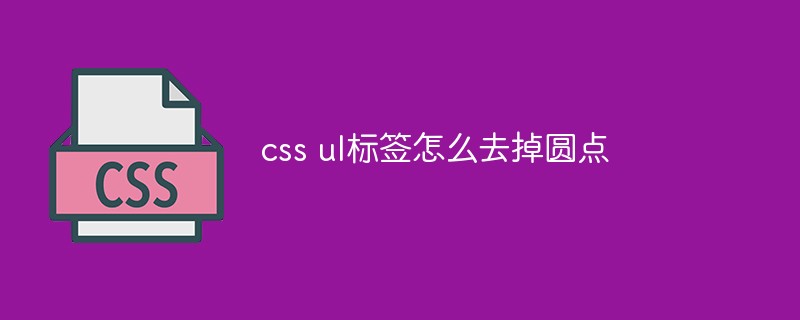 css ul标签怎么去掉圆点Apr 25, 2022 pm 05:55 PM
css ul标签怎么去掉圆点Apr 25, 2022 pm 05:55 PM在css中,可用list-style-type属性来去掉ul的圆点标记,语法为“ul{list-style-type:none}”;list-style-type属性可设置列表项标记的类型,当值为“none”可不定义标记,也可去除已有标记。
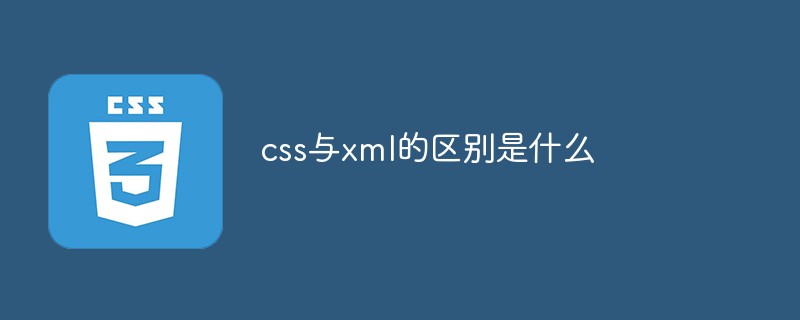 css与xml的区别是什么Apr 24, 2022 am 11:21 AM
css与xml的区别是什么Apr 24, 2022 am 11:21 AM区别是:css是层叠样式表单,是将样式信息与网页内容分离的一种标记语言,主要用来设计网页的样式,还可以对网页各元素进行格式化;xml是可扩展标记语言,是一种数据存储语言,用于使用简单的标记描述数据,将文档分成许多部件并对这些部件加以标识。
 css3怎么实现鼠标隐藏效果Apr 27, 2022 pm 05:20 PM
css3怎么实现鼠标隐藏效果Apr 27, 2022 pm 05:20 PM在css中,可以利用cursor属性实现鼠标隐藏效果,该属性用于定义鼠标指针放在一个元素边界范围内时所用的光标形状,当属性值设置为none时,就可以实现鼠标隐藏效果,语法为“元素{cursor:none}”。
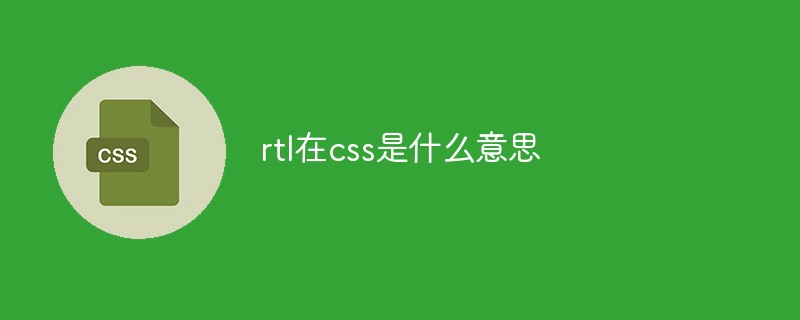 rtl在css是什么意思Apr 24, 2022 am 11:07 AM
rtl在css是什么意思Apr 24, 2022 am 11:07 AM在css中,rtl是“right-to-left”的缩写,是从右往左的意思,指的是内联内容从右往左依次排布,是direction属性的一个属性值;该属性规定了文本的方向和书写方向,语法为“元素{direction:rtl}”。
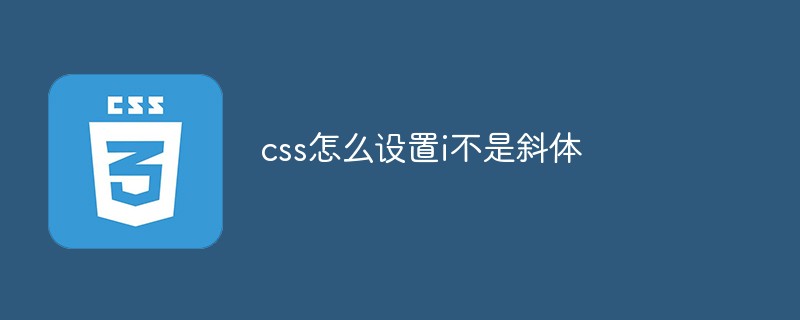 css怎么设置i不是斜体Apr 20, 2022 am 10:36 AM
css怎么设置i不是斜体Apr 20, 2022 am 10:36 AM在css中,可以利用“font-style”属性设置i元素不是斜体样式,该属性用于指定文本的字体样式,当属性值设置为“normal”时,会显示元素的标准字体样式,语法为“i元素{font-style:normal}”。
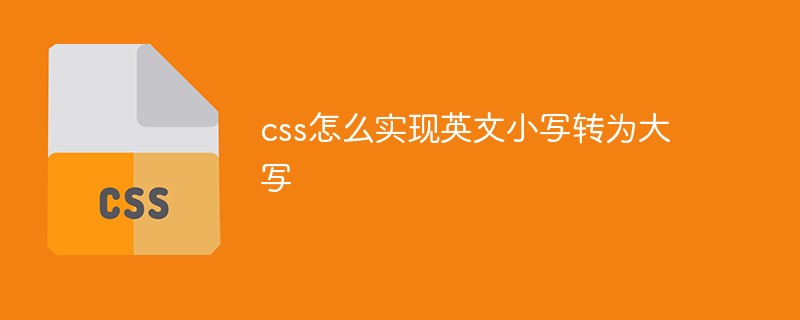 css怎么实现英文小写转为大写Apr 25, 2022 pm 06:35 PM
css怎么实现英文小写转为大写Apr 25, 2022 pm 06:35 PM转换方法:1、给英文元素添加“text-transform: uppercase;”样式,可将所有的英文字母都变成大写;2、给英文元素添加“text-transform:capitalize;”样式,可将英文文本中每个单词的首字母变为大写。
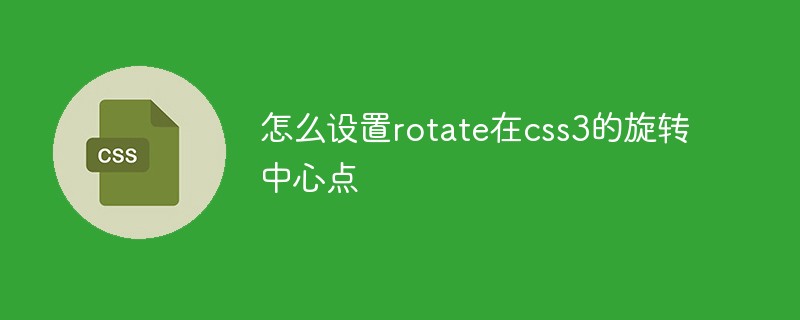 怎么设置rotate在css3的旋转中心点Apr 24, 2022 am 10:50 AM
怎么设置rotate在css3的旋转中心点Apr 24, 2022 am 10:50 AM在css3中,可以用“transform-origin”属性设置rotate的旋转中心点,该属性可更改转换元素的位置,第一个参数设置x轴的旋转位置,第二个参数设置y轴旋转位置,语法为“transform-origin:x轴位置 y轴位置”。


Hot AI Tools

Undresser.AI Undress
AI-powered app for creating realistic nude photos

AI Clothes Remover
Online AI tool for removing clothes from photos.

Undress AI Tool
Undress images for free

Clothoff.io
AI clothes remover

AI Hentai Generator
Generate AI Hentai for free.

Hot Article

Hot Tools

mPDF
mPDF is a PHP library that can generate PDF files from UTF-8 encoded HTML. The original author, Ian Back, wrote mPDF to output PDF files "on the fly" from his website and handle different languages. It is slower than original scripts like HTML2FPDF and produces larger files when using Unicode fonts, but supports CSS styles etc. and has a lot of enhancements. Supports almost all languages, including RTL (Arabic and Hebrew) and CJK (Chinese, Japanese and Korean). Supports nested block-level elements (such as P, DIV),

MantisBT
Mantis is an easy-to-deploy web-based defect tracking tool designed to aid in product defect tracking. It requires PHP, MySQL and a web server. Check out our demo and hosting services.

SAP NetWeaver Server Adapter for Eclipse
Integrate Eclipse with SAP NetWeaver application server.

Atom editor mac version download
The most popular open source editor

MinGW - Minimalist GNU for Windows
This project is in the process of being migrated to osdn.net/projects/mingw, you can continue to follow us there. MinGW: A native Windows port of the GNU Compiler Collection (GCC), freely distributable import libraries and header files for building native Windows applications; includes extensions to the MSVC runtime to support C99 functionality. All MinGW software can run on 64-bit Windows platforms.





